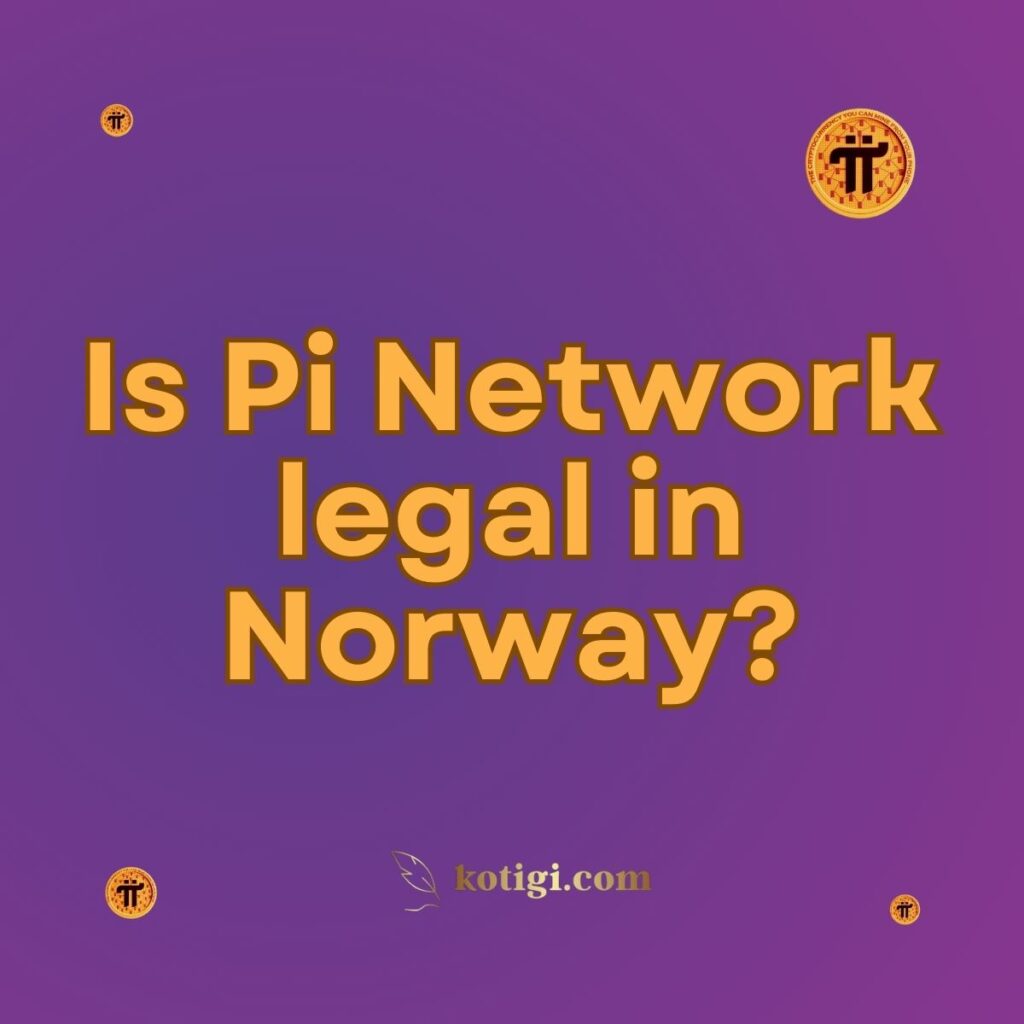
Is Pi Network legal in Norway?
Pi Network is currently legal in Norway, though it operates in a largely unregulated space. Norwegian users can participate in Pi Network, but they should be aware of potential future regulations as the country’s cryptocurrency framework evolves. Users should also keep in mind the risks associated with emerging digital assets like Pi.
Introduction
The increasing popularity of Pi Network across the globe has drawn attention from cryptocurrency enthusiasts in Norway. Given the country’s open-minded stance on financial technology and digital currencies, many Norwegian users are curious about the legal standing of Pi Network. As a mobile-based platform for mining cryptocurrency, Pi Network presents an innovative way for users to engage with digital assets. However, like many other countries, Norway does not have specific regulations targeting mobile mining platforms. This article examines whether Pi Network is legal in Norway, the country’s current stance on cryptocurrency regulation, and the potential implications for Norwegian users.
1. Cryptocurrency Regulations in Norway
1.1 Norway’s Approach to Cryptocurrencies
Norway is considered a progressive country when it comes to financial technologies, including cryptocurrencies. The Norwegian government has not implemented strict laws that ban the use or mining of cryptocurrencies like Bitcoin or Pi. Instead, it focuses on ensuring that cryptocurrency activities comply with the country’s financial regulations, especially concerning anti-money laundering (AML) and counter-terrorism financing (CTF). Pi Network, while still in its early stages, fits into this regulatory environment as it allows users to mine digital assets through a mobile application.
1.2 Role of the Norwegian Financial Supervisory Authority (Finanstilsynet)
The Norwegian Financial Supervisory Authority (Finanstilsynet) monitors financial markets in Norway and ensures that companies dealing with digital assets adhere to AML and CTF laws. Cryptocurrencies are considered assets but are not classified as legal tender, meaning they do not have the same legal protections as fiat currencies like the Norwegian Krone. Finanstilsynet advises that users of cryptocurrency platforms, including Pi Network, should exercise caution and understand the risks involved in dealing with unregulated digital assets.
1.3 European Union Influence on Norwegian Cryptocurrency Regulation
Although Norway is not a member of the European Union, it follows many EU guidelines and regulations through the European Economic Area (EEA) agreement. As the EU develops a comprehensive regulatory framework for digital assets through initiatives like the Markets in Crypto-Assets (MiCA) regulation, Norway is likely to adopt similar standards. This means that while Pi Network is legal now, future EU regulations may affect how the platform operates in Norway, especially concerning user protection and financial compliance.
2. Legal Considerations for Norwegian Users
2.1 Participation in Pi Network
Norwegian users are free to download and use Pi Network’s mobile app to mine Pi cryptocurrency. Since there are no specific laws against mobile mining, Pi Network users are not violating any local regulations by participating. However, it is important for users to keep in mind that Pi is still in its development phase, and the tokens mined have not yet achieved market value. As such, users are not subject to taxes or financial reporting for Pi tokens until they become tradeable on exchanges.
2.2 Taxation of Cryptocurrency in Norway
In Norway, the Norwegian Tax Administration (Skatteetaten) treats cryptocurrencies as taxable assets. This means that once Pi tokens are tradeable, any income or capital gains derived from Pi will be subject to taxation. Users are required to report any cryptocurrency earnings in their annual tax filings. Norwegian Pi Network users should be prepared to keep detailed records of their Pi mining activity for tax purposes once the currency is fully operational and tradeable.
2.3 Compliance with AML and CTF Laws
Norway enforces strict AML and CTF regulations. Although Pi Network does not currently involve monetary transactions or token trading, future developments in the platform could lead to more stringent regulations. Norwegian users should anticipate potential KYC (Know Your Customer) requirements that may be introduced as Pi Network evolves to ensure compliance with these financial laws. For now, users should remain cautious and keep up-to-date with any changes in regulation that could affect the platform.
3. Potential Risks for Norwegian Users
3.1 Regulatory Uncertainty
While Pi Network is currently legal, Norwegian users face some uncertainty about the future regulatory environment for mobile-based mining platforms and cryptocurrencies in general. Future legislation may impose new requirements for digital currencies, including Pi, that could affect the ease with which users can continue mining or holding Pi tokens. Users should monitor updates from both Norwegian and EU regulators to stay informed about potential changes that could impact Pi Network’s operations in Norway.
3.2 Security and Privacy Concerns
As with any digital platform, security and privacy are significant concerns for Pi Network users. Since the app is relatively new and operates in a decentralized manner, Norwegian users should be aware of potential risks such as hacking or data breaches. Users should take precautions by using strong passwords, enabling two-factor authentication, and being cautious of any phishing attempts. Ensuring their personal information and Pi tokens are secure is critical for avoiding cyber threats.
3.3 Lack of Consumer Protections
Norwegian users should understand that cryptocurrencies, including Pi, are not subject to the same consumer protections as traditional financial assets. If users experience losses due to technical issues, scams, or account compromises, they may have limited legal recourse. This lack of protection highlights the importance of using secure practices and being cautious when engaging with emerging platforms like Pi Network.
4. Opportunities for Pi Network Users in Norway
4.1 Accessible Cryptocurrency Mining
One of the key advantages of Pi Network for Norwegian users is its accessibility. Unlike traditional cryptocurrency mining, which often requires expensive hardware and high energy consumption, Pi Network allows users to mine Pi tokens using their smartphones. This feature opens up cryptocurrency mining to a broader audience, allowing people who might not have the resources for traditional mining to participate in the digital economy.
4.2 Early Adoption Benefits
Norwegian users who join Pi Network in its early stages could potentially benefit from being early adopters. If Pi Network grows in popularity and its tokens become tradeable on the open market, early participants may find themselves in a favorable position. The network’s focus on decentralization and community-driven development could create opportunities for long-term engagement with the platform.
4.3 Integration with Norway’s Tech Ecosystem
Norway has a strong reputation for embracing technology and innovation, particularly in the financial and energy sectors. As Pi Network develops, it could integrate into Norway’s broader tech ecosystem, creating opportunities for collaboration with local businesses and tech startups. Norwegian users who are active in the Pi community may find opportunities to contribute to the platform’s development and help shape its future.
5. What to Expect in the Future
5.1 Potential Regulatory Changes
As Pi Network continues to evolve, Norwegian users should anticipate potential changes to the regulatory landscape for digital assets. The EU’s MiCA regulation, once implemented, could provide a more structured framework for platforms like Pi Network, and Norway is likely to follow suit through the EEA agreement. Users should stay informed about these regulatory developments to ensure that their participation in Pi Network remains compliant with any new laws or requirements.
5.2 Increased KYC Requirements
As Pi Network transitions from its current stage to a fully functional digital currency platform, it may introduce more stringent KYC requirements to comply with AML and CTF regulations. Norwegian users should be prepared to submit identification documents and other verification information as part of the platform’s efforts to enhance security and legal compliance.
5.3 Technological Advancements and User Experience Improvements
Pi Network is still in its early development stages, but its roadmap includes significant technological advancements aimed at improving user experience and security. Norwegian users can expect the platform to introduce new features such as wallet integration, token trading, and possibly partnerships with local merchants or businesses. These advancements will likely make Pi Network a more robust and user-friendly platform, attracting even more users in Norway.
Conclusion
Pi Network is currently legal in Norway, and Norwegian users can participate in the platform without any legal concerns. However, users should be mindful of the potential risks and stay informed about future regulatory developments. Norway’s progressive stance on technology and digital currencies makes it a promising market for platforms like Pi Network, but users must exercise caution and ensure they are prepared for any changes in laws or platform requirements.
Key Takeaways
- Pi Network is legal in Norway, and users can mine Pi without violating local laws.
- Norwegian authorities regulate digital assets, but Pi tokens are not yet subject to taxation until they become tradeable.
- Future regulations, particularly from the EU’s MiCA initiative, may impact Pi Network’s operations in Norway, requiring users to comply with new rules.
- Users should be aware of security risks and take precautions to protect their personal information and assets on Pi Network.
- Pi Network offers Norwegian users an accessible way to engage with cryptocurrency mining, and early adopters could benefit from future developments.





